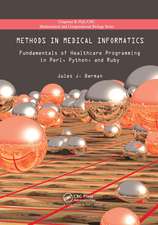Microengineering in Biotechnology: Methods in Molecular Biology, cartea 583
Editat de Michael P. Hughes, Kai F. Hoettgesen Limba Engleză Paperback – 7 mar 2012
In Microengineering in Biotechnology, experts in the field contribute chapters aimed at instilling in the reader a working understanding of the methods underlying microengineering and the means by which such methods can be used for a range of analytical techniques. It describes the methods by which microengineered devices can be built to perform a number of applications and considers how the field may progress by examining some more complex lab on a chip devices which have great potential in the advancement of the way in which molecular biology is performed. As a volume in the highly successful Methods in Molecular Biology™ series, this work provides the kind of detailed description and implementation advice that is crucial for getting optimal results.
Cutting-edge yet easy-to-use, Microengineering in Biotechnology serves as a reference guide for practical microengineering techniques and as a route into the development of new devices for biological applications in order to strengthen the promising union of molecular and cellular biology with microelectronics.
| Toate formatele și edițiile | Preț | Express |
|---|---|---|
| Paperback (1) | 567.05 lei 38-44 zile | |
| Humana Press Inc. – 7 mar 2012 | 567.05 lei 38-44 zile | |
| Hardback (1) | 578.29 lei 38-44 zile | |
| Humana Press Inc. – 22 sep 2009 | 578.29 lei 38-44 zile |
Din seria Methods in Molecular Biology
- 9%
 Preț: 791.59 lei
Preț: 791.59 lei - 23%
 Preț: 598.56 lei
Preț: 598.56 lei - 20%
 Preț: 882.95 lei
Preț: 882.95 lei -
 Preț: 252.04 lei
Preț: 252.04 lei - 5%
 Preț: 802.69 lei
Preț: 802.69 lei - 5%
 Preț: 729.61 lei
Preț: 729.61 lei - 5%
 Preț: 731.43 lei
Preț: 731.43 lei - 5%
 Preț: 741.30 lei
Preț: 741.30 lei - 5%
 Preț: 747.16 lei
Preț: 747.16 lei - 15%
 Preț: 663.45 lei
Preț: 663.45 lei - 18%
 Preț: 1025.34 lei
Preț: 1025.34 lei - 5%
 Preț: 734.57 lei
Preț: 734.57 lei - 18%
 Preț: 914.20 lei
Preț: 914.20 lei - 15%
 Preț: 664.61 lei
Preț: 664.61 lei - 15%
 Preț: 654.12 lei
Preț: 654.12 lei - 18%
 Preț: 1414.74 lei
Preț: 1414.74 lei - 5%
 Preț: 742.60 lei
Preț: 742.60 lei - 20%
 Preț: 821.63 lei
Preț: 821.63 lei - 18%
 Preț: 972.30 lei
Preț: 972.30 lei - 15%
 Preț: 660.49 lei
Preț: 660.49 lei - 5%
 Preț: 738.41 lei
Preț: 738.41 lei - 18%
 Preț: 984.92 lei
Preț: 984.92 lei - 5%
 Preț: 733.29 lei
Preț: 733.29 lei -
 Preț: 392.58 lei
Preț: 392.58 lei - 5%
 Preț: 746.26 lei
Preț: 746.26 lei - 18%
 Preț: 962.66 lei
Preț: 962.66 lei - 23%
 Preț: 860.21 lei
Preț: 860.21 lei - 15%
 Preț: 652.64 lei
Preț: 652.64 lei - 5%
 Preț: 1055.50 lei
Preț: 1055.50 lei - 23%
 Preț: 883.85 lei
Preț: 883.85 lei - 19%
 Preț: 491.88 lei
Preț: 491.88 lei - 5%
 Preț: 1038.84 lei
Preț: 1038.84 lei - 5%
 Preț: 524.15 lei
Preț: 524.15 lei - 18%
 Preț: 2122.34 lei
Preț: 2122.34 lei - 5%
 Preț: 1299.23 lei
Preț: 1299.23 lei - 5%
 Preț: 1339.10 lei
Preț: 1339.10 lei - 18%
 Preț: 1390.26 lei
Preț: 1390.26 lei - 18%
 Preț: 1395.63 lei
Preț: 1395.63 lei - 18%
 Preț: 1129.65 lei
Preț: 1129.65 lei - 18%
 Preț: 1408.26 lei
Preț: 1408.26 lei - 18%
 Preț: 1124.92 lei
Preț: 1124.92 lei - 18%
 Preț: 966.27 lei
Preț: 966.27 lei - 5%
 Preț: 1299.99 lei
Preț: 1299.99 lei - 5%
 Preț: 1108.51 lei
Preț: 1108.51 lei - 5%
 Preț: 983.72 lei
Preț: 983.72 lei - 5%
 Preț: 728.16 lei
Preț: 728.16 lei - 18%
 Preț: 1118.62 lei
Preț: 1118.62 lei - 18%
 Preț: 955.25 lei
Preț: 955.25 lei - 5%
 Preț: 1035.60 lei
Preț: 1035.60 lei - 18%
 Preț: 1400.35 lei
Preț: 1400.35 lei
Preț: 567.05 lei
Preț vechi: 708.81 lei
-20% Nou
Puncte Express: 851
Preț estimativ în valută:
108.50€ • 113.59$ • 89.78£
108.50€ • 113.59$ • 89.78£
Carte tipărită la comandă
Livrare economică 01-07 aprilie
Preluare comenzi: 021 569.72.76
Specificații
ISBN-13: 9781617796401
ISBN-10: 1617796409
Pagini: 264
Ilustrații: X, 252 p. 103 illus.
Dimensiuni: 193 x 260 x 14 mm
Ediția:2010
Editura: Humana Press Inc.
Colecția Humana
Seria Methods in Molecular Biology
Locul publicării:Totowa, NJ, United States
ISBN-10: 1617796409
Pagini: 264
Ilustrații: X, 252 p. 103 illus.
Dimensiuni: 193 x 260 x 14 mm
Ediția:2010
Editura: Humana Press Inc.
Colecția Humana
Seria Methods in Molecular Biology
Locul publicării:Totowa, NJ, United States
Public țintă
ResearchCuprins
Microfabrication Techniques for Biologists: A Primer on Building Micromachines.- The Application of Microfluidics in Biology.- Rapid Prototyping of Microstructures by Soft Lithography for Biotechnology.- Chemical Synthesis in Microreactors.- The Electroosmotic Flow (EOF).- Microengineered Neural Probes for In Vivo Recording.- Impedance Spectroscopy and Optical Analysis of Single Biological Cells and Organisms in Microsystems.- Dielectrophoresis as a Cell Characterisation Tool.- AC-Electrokinetic Applications in a Biological Setting.- Wireless Endoscopy: Technology and Design.
Textul de pe ultima copertă
Microelectronic engineering has revolutionized electronics, providing new, faster and cheaper ways of doing things – and now the same technology is being applied to biotechnology and molecular biology. As sample volume is reduced, reaction speed and detector sensitivity are increased while sample and reagent requirements and device cost are reduced. Microelectronic engineering provides the potential for bench-top versions of large and expensive equipment such as flow cytometry, or novel ones that exploit physical phenomena on the micron scale, such as dielectrophoresis for cell analysis.
In Microengineering in Biotechnology, experts in the field contribute chapters aimed at instilling in the reader a working understanding of the methods underlying microengineering and the means by which such methods can be used for a range of analytical techniques. It describes the methods by which microengineered devices can be built to perform a number of applications and considers how the field may progress by examining some more complex lab on a chip devices which have great potential in the advancement of the way in which molecular biology is performed. As a volume in the highly successful Methods in Molecular Biology™ series, this work provides the kind of detailed description and implementation advice that is crucial for getting optimal results.
Cutting-edge yet easy-to-use, Microengineering in Biotechnology serves as a reference guide for practical microengineering techniques and as a route into the development of new devices for biological applications in order to strengthen the promising union of molecular and cellular biology with microelectronics.
In Microengineering in Biotechnology, experts in the field contribute chapters aimed at instilling in the reader a working understanding of the methods underlying microengineering and the means by which such methods can be used for a range of analytical techniques. It describes the methods by which microengineered devices can be built to perform a number of applications and considers how the field may progress by examining some more complex lab on a chip devices which have great potential in the advancement of the way in which molecular biology is performed. As a volume in the highly successful Methods in Molecular Biology™ series, this work provides the kind of detailed description and implementation advice that is crucial for getting optimal results.
Cutting-edge yet easy-to-use, Microengineering in Biotechnology serves as a reference guide for practical microengineering techniques and as a route into the development of new devices for biological applications in order to strengthen the promising union of molecular and cellular biology with microelectronics.
Caracteristici
Discover new ways of screening; everything from molecular fractionation to label-free electrophysiology of suspended cells, from neural interfaces to laboratories on a chip Provides a comprehensive description of microengineering fabrication techniques in simple terms – an ideal resource for anyone, from beginner to expert Covers a wide range of assay formats and technologies, from well-established to experimental Presents a modular approach to experimental design, covering screening modalities, detection technologies, and approaches to data analysis Includes in-depth analyses of how microengineering can be applied both in vitro and in vivo




















